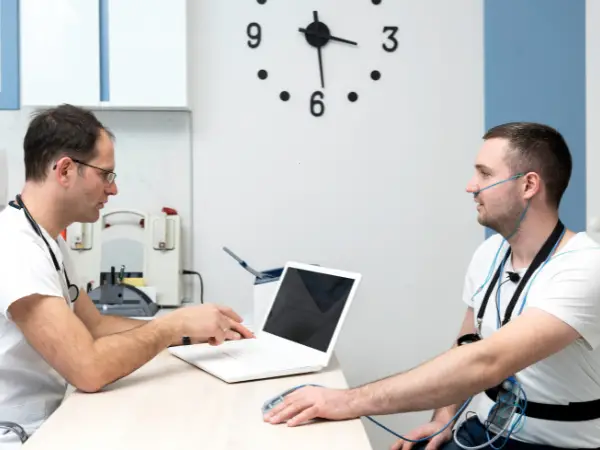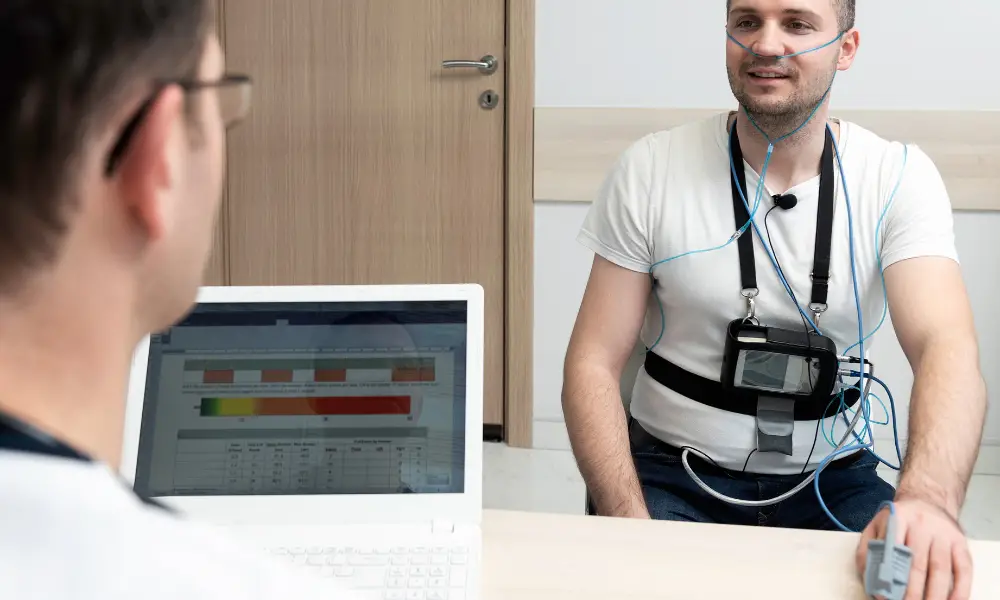Yes, you can get a sleep study without a referral. Many sleep clinics offer direct access to sleep studies.
Sleep studies help diagnose sleep disorders like sleep apnea, insomnia, and narcolepsy. These disorders affect your sleep quality and overall health. Some clinics allow patients to book sleep studies directly, bypassing the need for a referral. Direct access can speed up diagnosis and treatment.
It’s essential to check with your insurance provider, as some policies may require a referral for coverage. Many clinics provide consultations to determine if a sleep study is necessary.
Table of Contents
Introduction To Sleep Studies
Many people wonder, can you get a sleep study without a referral? Sleep studies are crucial for diagnosing sleep disorders and improving overall health. Understanding sleep studies is the first step toward better sleep. Let’s dive into the world of sleep studies.
What Is A Sleep Study?
A sleep study, also known as polysomnography, is a test that records your body’s activity during sleep. It helps doctors identify sleep disorders such as sleep apnea, insomnia, and restless leg syndrome.
During a sleep study, the following measurements are taken:
- Brain activity through electroencephalogram (EEG)
- Eye movement using electrooculogram (EOG)
- Muscle activity via electromyogram (EMG)
- Heart rate using electrocardiogram (ECG)
- Breathing patterns and oxygen levels
These measurements help doctors understand your sleep stages and identify any disruptions.
| Measurement | Purpose |
|---|---|
| EEG | Monitors brain waves |
| EOG | Tracks eye movements |
| EMG | Records muscle activity |
| ECG | Checks heart rate |
| Breathing monitors | Observes breathing patterns |
Types Of Sleep Studies
There are various types of sleep studies, each designed for specific issues. Here are the most common ones:
- Polysomnography: The most comprehensive sleep study. It monitors brain waves, oxygen levels, heart rate, and breathing. Usually done in a sleep lab.
- Home Sleep Apnea Testing (HSAT): Conducted at home. It focuses on diagnosing sleep apnea. Less comprehensive but more convenient.
- Multiple Sleep Latency Test (MSLT): Measures how quickly you fall asleep in quiet environments during the day. Used to diagnose narcolepsy.
- Maintenance of Wakefulness Test (MWT): Assesses your ability to stay awake in quiet situations. Helps determine the severity of excessive daytime sleepiness.
Each type of sleep study provides different insights into your sleep health.
Understanding these studies helps you make informed decisions about your sleep health. Knowing what to expect can ease any concerns you might have.
Importance Of Sleep Health
Understanding the importance of sleep health can help answer this question. Sleep affects every part of life. From mood to memory, sleep plays a vital role. Let’s explore why sleep health matters so much.
Consequences Of Sleep Disorders
Sleep disorders can have serious effects. They affect both physical and mental health. Here are some key consequences:
- Fatigue: Lack of sleep leads to constant tiredness. It makes daily tasks harder.
- Memory Issues: Poor sleep harms memory. It makes learning new things tough.
- Mood Swings: Sleep disorders cause mood changes. People often feel irritable.
- Weakened Immune System: Sleep helps the body fight off illnesses. Without enough sleep, the immune system weakens.
- Increased Risk of Accidents: Tiredness leads to accidents. This is especially true for driving.
Sleep disorders can also lead to more severe health problems. These include:
| Health Issue | Impact |
|---|---|
| Heart Disease | Higher risk due to poor sleep |
| Diabetes | Increased risk with sleep problems |
| Obesity | Poor sleep leads to weight gain |
Understanding these consequences highlights the need for good sleep health.
Benefits Of Sleep Studies
Sleep studies offer many benefits. They help diagnose and treat sleep disorders. Here are some key advantages:
- Accurate Diagnosis: Sleep studies provide detailed information. They help doctors find the exact problem.
- Personalized Treatment: With a clear diagnosis, doctors can create a tailored treatment plan.
- Better Sleep Quality: Proper treatment leads to better sleep. This improves overall health and well-being.
- Improved Daytime Function: Better sleep means more energy and focus during the day.
- Reduced Health Risks: Treating sleep disorders lowers the risk of serious health issues.
Sleep studies also offer peace of mind. Knowing the root cause of sleep problems can be a huge relief. Here is a quick look at the process and benefits:
| Step | Benefit |
|---|---|
| Initial Consultation | Discuss symptoms and history |
| Overnight Study | Monitor sleep patterns |
| Diagnosis | Identify sleep disorder |
| Treatment Plan | Customized to individual needs |
Understanding the benefits of sleep studies can encourage people to seek help. Good sleep is essential for a healthy life.

Navigating Sleep Study Options
Are you wondering if you can get a sleep study without a referral? Navigating sleep study options might seem daunting, but understanding the different types of sleep studies available can help.
In-lab Sleep Studies
In-lab sleep studies, also known as polysomnography, are conducted in a specialized sleep center. These studies provide detailed data about your sleep patterns and any disturbances.
Here are some key features of in-lab sleep studies:
- Comprehensive Monitoring: Tracks brain waves, oxygen levels, heart rate, and breathing.
- Professional Oversight: Conducted under the supervision of sleep technicians and doctors.
- Controlled Environment: Ensures accurate data by minimizing external disturbances.
Benefits of in-lab sleep studies include:
- Accurate diagnosis of complex sleep disorders.
- Access to immediate medical assistance if needed.
- Detailed reports for comprehensive treatment plans.
Drawbacks might include:
- Higher cost compared to home tests.
- Potential discomfort from sleeping in an unfamiliar environment.
Typical Process:
- Arrive at the sleep center in the evening.
- Get hooked up to monitoring equipment.
- Sleep overnight while data is recorded.
- Receive results and follow-up recommendations.
Home Sleep Tests
Home sleep tests offer a convenient alternative to in-lab studies. These tests can be conducted in the comfort of your own home and are designed to diagnose obstructive sleep apnea (OSA).
Here are some key features of home sleep tests:
- Convenience: Conducted in your own bedroom.
- Simplicity: Uses portable devices that are easy to set up.
- Affordability: Generally less expensive than in-lab studies.
Benefits of home sleep tests include:
- Comfort of sleeping in your own bed.
- Lower overall cost.
- Good for detecting specific sleep issues like sleep apnea.
Drawbacks might include:
- Less comprehensive data compared to in-lab studies.
- Limited to diagnosing specific conditions like OSA.
- Potential user error in setting up the equipment.
Typical Process:
- Receive a home sleep test kit.
- Follow instructions to set up the device.
- Sleep overnight with the device recording data.
- Return the device and receive results.
Referral Requirements
This section explores why referrals are common and highlights some exceptions to the rule.
Why Referrals Are Common
Referrals for sleep studies are common for several reasons. Doctors often provide referrals to ensure the sleep study is medically necessary. Here are some key points:
- Insurance Coverage: Most insurance companies require a doctor’s referral to cover the cost of a sleep study. This helps them avoid unnecessary tests.
- Medical History: A doctor needs to review your medical history. This helps determine if a sleep study is the right step for you.
- Specialist Insight: Referrals often come from specialists. They have more expertise in diagnosing sleep disorders than general practitioners.
- Health Monitoring: Continuous monitoring of your health by a primary care physician is crucial. They can track your progress before and after the sleep study.
Doctors also use referrals to ensure you get the most accurate diagnosis. Sleep studies can be expensive, and referrals help make sure your test is necessary. Patient safety is another reason. Doctors can identify any health risks before you undergo a sleep study.
Exceptions To The Rule
While referrals are common, there are exceptions to the rule. Some situations allow you to get a sleep study without a referral:
- Self-Referral Programs: Some sleep centers offer self-referral programs. You can directly contact these centers to schedule a sleep study.
- Insurance Plans: Certain insurance plans do not require a doctor’s referral for a sleep study. Always check with your insurance provider first.
- Out-of-Pocket Payments: If you are willing to pay out of pocket, many centers will allow you to schedule a sleep study without a referral.
- Telemedicine Services: Some telemedicine services offer online consultations. They can approve a sleep study without needing an in-person referral.
Below is a table summarizing the exceptions:
| Exception | Description |
|---|---|
| Self-Referral Programs | Contact sleep centers directly to schedule. |
| Insurance Plans | Some plans do not require a referral. |
| Out-of-Pocket Payments | Paying yourself can waive the need for a referral. |
| Telemedicine Services | Online consultations can approve studies. |
In summary, while referrals are standard, several options exist to bypass this requirement. Always research and consult with professionals to find the best path for your needs.
Direct Access To Sleep Studies
Direct access means you can book a sleep study yourself, without needing a doctor’s referral. This option can save time and make the process easier for many people.
Finding Facilities
To find facilities that offer direct access to sleep studies, start with an online search. Many sleep centers now allow patients to book their own sleep studies. Here are some tips to help you find the right place:
- Search Online: Use search engines to look for sleep centers in your area. Keywords like “direct access sleep study” or “sleep study without referral” can help.
- Check Reviews: Look at reviews from other patients. Positive reviews can give you confidence in the facility.
- Call Ahead: Contact the sleep center directly. Ask if they offer direct access and what the process involves.
Once you have a list of potential facilities, compare their services. Some may offer in-home sleep studies, while others require you to stay overnight at their center. Here’s a simple table to help you compare:
| Facility | In-Home Study | Overnight Study |
|---|---|---|
| USA Sleep Diagnostic Services | No | No |
| Stanford Health Care Sleep Medicine Center | Yes | Yes |
Cost Considerations
The cost of a sleep study can vary. Without a referral, you may have to pay out of pocket. Here are some points to keep in mind:
- Insurance Coverage: Check if your insurance covers sleep studies without a referral. Some plans may cover part or all of the cost.
- Facility Fees: Different facilities charge different rates. Ask for a price list when you contact them.
- Additional Costs: There may be extra fees for things like consultations or follow-up visits. Make sure to ask about all potential costs.
For a clearer understanding, here’s an example of possible costs:
| Service | Cost |
|---|---|
| Initial Consultation | $100-$200 |
| Overnight Sleep Study | $500-$3,000 |
| In-Home Sleep Study | $300-$1,500 |
Understanding these costs can help you budget and make an informed decision about your sleep health.
Insurance And Sleep Studies
Insurance and sleep studies can be confusing. This post will guide you on how insurance works for sleep studies, especially without a referral. Understand your options and make informed decisions about your health.
Coverage Without A Referral
Some insurance companies cover sleep studies without a referral. This depends on your insurance plan. Here are some key points to consider:
- Policy Details: Check your insurance policy. Some plans allow sleep studies without a referral. Others may require one.
- Network Providers: Choose in-network providers. They often have agreements with insurance companies to cover sleep studies.
- Pre-authorization: Some plans need pre-authorization. Call your insurance provider to confirm.
Consider the following table for a quick overview:
| Insurance Requirement | Action |
|---|---|
| Referral Required | Get a referral from your primary doctor. |
| No Referral Required | Book a sleep study directly. |
| Pre-authorization Needed | Contact insurance for approval. |
Always double-check with your insurance company. Policies change. You don’t want unexpected bills.
Out-of-pocket Expenses
Even with insurance, you might have out-of-pocket expenses. These costs vary based on several factors:
- Deductibles: If you haven’t met your deductible, you may pay more.
- Co-pays: Some plans have co-pays for sleep studies.
- Out-of-Network Providers: Going to an out-of-network provider can cost more.
Here’s a simple breakdown:
| Expense Type | Estimated Cost |
|---|---|
| Deductible | $500 – $1500 |
| Co-pay | $20 – $50 |
| Out-of-Network Fee | Up to $2000 |
Understanding these costs helps avoid surprises. Always ask for an estimate before your sleep study. This helps you plan better and ensures you get the care you need without breaking the bank.
Frequently Asked Questions
Can You Get A Sleep Test Without A Referral?
Yes, you can get a sleep test without a referral. Many sleep clinics offer direct appointments. Check local regulations.
Can I Refer Myself To A Sleep Clinic?
Yes, you can refer yourself to a sleep clinic. Check if your insurance requires a referral from your primary doctor.
Is A Referral Needed For Sleep Apnea?
A referral is usually needed for sleep apnea diagnosis. Check with your healthcare provider and insurance for specific requirements.
What Is The Cost Of A Sleep Study Test?
The cost of a sleep study test ranges from $500 to $3,000. Prices vary based on location and insurance coverage.



